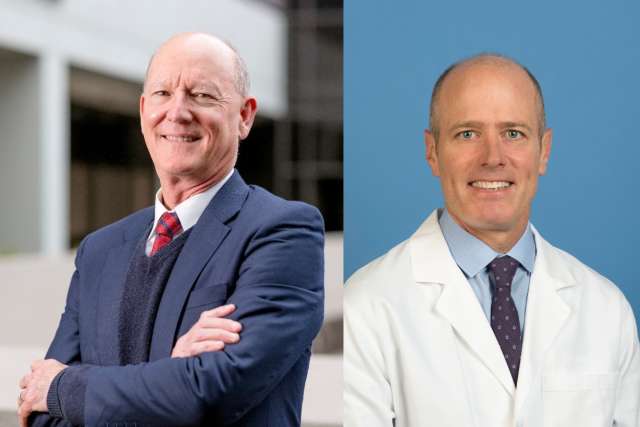S. Thomas Carmichael, MD, PhD, and Paul W. Noble, MD, have been elected to the National Academy of Medicine (NAM), one of the highest honors in the fields of health and medicine.
Dr. Carmichael is chair of the Department of Neurology at UCLA Health and professor of neurology and neurobiology at the David Geffen School of Medicine at UCLA. Dr. Noble is a professor-in-residence at the David Geffen School of Medicine at UCLA and member of the academic senate at UCLA.
Election to NAM recognizes individuals who have demonstrated outstanding professional achievement and commitment to service. NAM elected Dr. Carmichael for pioneering research that has transformed the understanding of how the brain repairs itself after stroke and other injuries, and for translating these discoveries into novel therapeutic approaches including stem cell therapies and rehabilitation drugs that enhance recovery. Dr. Noble was elected in recognition of research of the mechanisms of persistent lung inflammation and fibrosis, including development of FDA-approved treatment for idiopathic pulmonary fibrosis (IPF).
“We are incredibly proud of Drs. Carmichael's and Noble's election to the National Academy of Medicine," said Steven M. Dubinett, MD, dean of the David Geffen School of Medicine at UCLA. "Dr. Carmichael's groundbreaking work in stroke recovery and neural repair has opened new pathways for treating brain injury, while Dr. Noble's elucidation of fundamental mechanisms in lung inflammation and fibrosis has led to FDA-approved treatments for Idiopathic Pulmonary Fibrosis. Their achievements reflect the innovative research and clinical excellence that define UCLA Health.”
Dr. Carmichael's laboratory has made seminal discoveries about the brain's capacity for regeneration after stroke. His research identified signals that the brain sends that lead to progressive injury and block repair and recovery in stroke and in vascular dementia — the second leading cause of dementia. This work has led to the discovery that strokes create partially damaged neural circuits that can be restored to normal functioning with experimental drugs, fundamentally changing how scientists approach stroke recovery.
Among his most significant contributions, Dr. Carmichael's team discovered the role of the CCR5 gene in stroke recovery and developed a clinical trial testing maraviroc, an FDA-approved drug, to enhance recovery in stroke patients. More recently, his laboratory identified DDL-920, the first drug shown to fully reproduce the effects of physical rehabilitation in preclinical models by restoring brain connections lost after stroke.
"I am honored by this recognition from the National Academy of Medicine," said Carmichael. "This reflects the dedication of my research team and our clinical colleagues who work together to translate laboratory discoveries into new treatments for stroke patients. Our approach has always been bidirectional — advances in the lab lead to clinical trials, while interactions with patients point to new research directions."
Dr. Carmichael received his MD and PhD degrees from Washington University School of Medicine and completed his neurology residency at Washington University, serving as Chief Resident. He was a Howard Hughes Medical Institute postdoctoral fellow at UCLA before joining the faculty in 2001. He holds the Frances Stark Professorship in Neurology and serves as an attending physician on the General Neurology Inpatient service and sees patients in the Neurology outpatient clinic at UCLA.
He is an elected member of the Association of American Physicians and is President-elect of the American Neurological Association. He is past president of the American Society for Neurorehabilitation and has served on NIH/NINDS Council. Dr. Carmichael has led NIH and national policy summits to advance the field of neural repair and has been recognized as a Los Angeles Business Journal Leader of Influence among LA's Top Doctors.
Dr. Noble is a physician-scientist specializing in pulmonary fibrosis whose research has elucidated fundamental mechanisms of chronic lung inflammation and fibrosis. His work has been instrumental in transforming idiopathic pulmonary fibrosis (IPF) from a disease with no effective treatments to one with FDA-approved therapies that extend and improve patients' lives.
His research has established specialized care for patients with interstitial lung disease. He founded ILD clinics at Johns Hopkins, Yale and Cedars-Sinai, creating centers of excellence that combine cutting-edge research with comprehensive patient care. His involvement in clinical trial design and drug development has directly contributed to bringing new therapeutic options to patients with IPF.
Dr. Noble received his MD from NYU and completed his internal medicine residency at UCSF, where he served as chief medical resident. After fellowships in pulmonary and critical care medicine at the University of Colorado and a research fellowship at National Jewish Center in Denver, he held faculty positions at Johns Hopkins and Yale before joining Duke University in 2006 as Chief of the Division of Pulmonary, Allergy and Critical Care Medicine. In 2013, he became Chair of the Department of Medicine and Director of the Women's Guild Lung Institute at Cedars-Sinai Medical Center in Los Angeles.
The National Academy of Medicine elected 90 regular members and 10 international members during its annual meeting in October, bringing NAM's total membership to more than 2,400, including more than 50 from UCLA. New members are elected by current members through a process that recognizes major contributions to the advancement of medical sciences, healthcare, and public health. NAM ensures a diversity of talent among its membership, with at least one-quarter of members selected from fields outside the health professions, such as law, engineering, social sciences, and the humanities.




